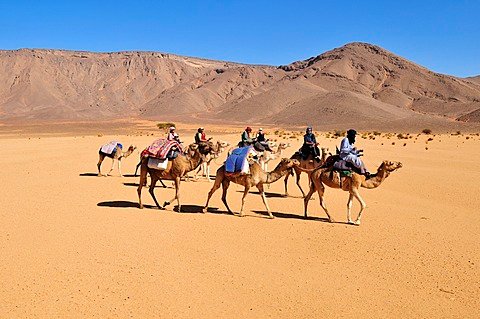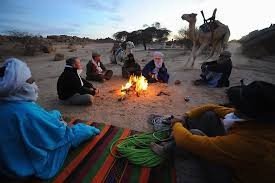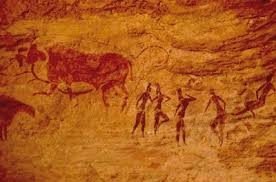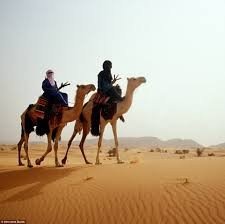Touareg of Algeria
Touareg of Algeria
The Touareg are nomadic Berber people living in the central Sahara in Algeria, Libya and on the borders of Sahel, Niger, Mali, and Burkina Faso. Their Berber culture is confirmed by the use of the Tifinagh alphabet ( engraved on the rocks in Hoggar and Tassili mountains in Algeria) and the same linguistic base known as Tamasheq (Touareg language). They are the descendants of the first inhabitants of North Africa. They are often called by the westerners, the "blue men", referring to the color of their originally indigo turbans (it discolors on the skin over time). It is not known exactly how long the Touareg tribes have existed, but it is suggested that they have been on the Algerian soil for hundreds of years.
There are several hypotheses concerning the origin of the word "Touareg". Some said that it would seem that the term "Touareg" derives from the Berber word" Targa" (meaning "lagoon" or "valley") .Other said that "Touareg" is of Arab origin (tawarek meaning "forgotten by God"); themselves call themselves "Kel-tamasheq", i.e. those who speak the Touareg language (tamasheq). However, Touaregs have a difficulty of understanding each other because of the dialectal differences within their language.
They are distributed and divided into several confederations and tribes, one and a half million Touaregs live in five African countries which are mentioned above. They spread over vast areas; they cannot live everywhere in the same way. Those of the north raise camels and goats, those of the south (Adrar) have more diversified herds (raise even cows), and those of the Aïr cultivate in the irrigated gardens Valleys, and also trade. Their social life is governed by their own laws. Their hierarchical system is composed of various tribes; The Imajaghan (also called Imohar), tribes of nobles and aristocratic warriors from which the supreme chief, the Amenokal, was chosen; The Imrad, of the vassal tribes i.e. they are non-aristocratic but sometimes they participate in warlike expeditions if need so; The Ineslemen, maraboutic tribes; The Inaden, blacksmiths who produce all that the population needs (weapons, jewels, pottery); The Iklan, blacks employed as domestic slaves; The Irawellan, the former Tuareg captives, and the Bellas and Bouzous, liberated slaves, respectively speaking Songhaï and Haoussa.
The Tuaregs are Muslims (which does not exclude many magical and superstitious practice), but monogamous. Women play a big role in society and culture. The field of art, poetry in particular is partly the domain of women. The male-female relationship is much more flexible than in the Arab world. The wife can choose her husband and she disposes of her personal fortune. The tent belongs to her, thus she can drive away the man.
Henri Duveyrier, in 1864,described the Touaregs in his book The Touareg of the North as follow:"white Berber little islamized, fierce warriors with their shield of antelope skin that macerated in sour milk, feudal society based on matriarchy, nomadism assimilated to freedom, wisdom and simplicity, " Lords of the desert "mysterious by their dress, their veil".
As all Algerians, the Touaregs opposed the arrival of the European colonizers. In 1916-17 their revolts against the French had some success. Already the military-scientific expedition led by Lt. Paul Flatters was decimated by the Touaregs on 16 February 1881 in Bir el-Garama in the Sahara. During independence in 1962, Touaregs were marginalized in the most desert areas; they feel abandoned, considered second-class citizens. As a result, the revolt will now be recurrent with a little attempt to build a Touareg nation.
The Touareg have derived their reputation as men from unapproachable sands by means of their customs, which impose a certain reserve on foreigners. This does not prevent the majority of the Touareg from being very welcoming. Their famous sharing of tea in tents in the middle of the desert, in a warm and intimate setting, makes it possible to unite the different tribes, or at least to allow the men a little calm and serenity in an arid decor (Sahara). As an evidence, their regular contact with the peoples of the neighboring countries led to the entry of Islam into their lives hundreds of years ago
written by ARAB Sabrina





Using the Code Trading System method is the easiest way to trade oil. It’s good and I earn with it really well. To learn more Google Code Trading System.
ReplyDelete